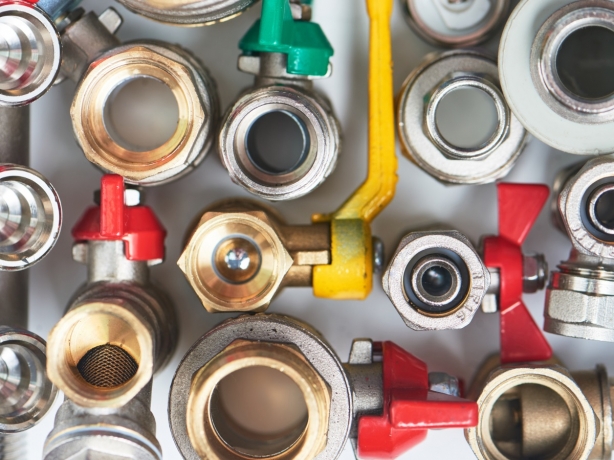Introduction
Valves play a fundamental role in commercial plumbing, controlling water flow, pressure, and temperature within various systems. Selecting the correct valve type is essential, as each is uniquely designed to meet specific operational requirements, from handling high-pressure needs to preventing backflow. For contractors, choosing the right valve impacts not only the functionality and safety of the plumbing system but also its long-term durability and maintenance costs. A carefully chosen valve will reduce wear on the system, extend its lifespan, and minimize repair needs. NTVAL valve technologies specializes in providing a wide range of reliable valve solutions for commercial and industrial applications. By evaluating project specifications and understanding the differences between valve types, contractors can ensure efficient operation and reliable performance for commercial plumbing installations over the years.
Understanding Valve Types and Functions
In commercial plumbing, different types of valves help ensure that each component of the system operates effectively. Ball valves are highly popular for quick shut-off applications. They have a simple quarter-turn mechanism that allows for immediate, precise control, making them ideal for situations requiring swift response times, such as emergency shut-off points. Gate valves are designed for applications that require the valve to be either fully open or fully closed, making them ideal for isolating sections of a system for maintenance or repairs. When the valve is open, gate valves offer minimal resistance to flow, which is valuable in larger pipes where pressure loss is a concern.
Butterfly valves use a rotating disc to regulate flow, providing a compact solution that fits well in large-diameter pipes, especially where space constraints exist. As a prominent manufacturer of butterfly valves, NTVAL offers high-quality options designed to perform reliably in various commercial applications. Check valves are essential in systems that require flow in only one direction, preventing backflow which can cause contamination or system damage, particularly in wastewater or pressurized systems. Globe valves, on the other hand, are used for precise flow control and are ideal in applications where the flow rate needs to be adjusted frequently. Each of these valve types plays a unique role in managing flow and pressure, allowing contractors to build efficient, adaptable, and reliable commercial plumbing systems.
Factors to Consider in Valve Selection
Several critical factors should guide contractors in selecting the best valve for each commercial plumbing application to enhance efficiency and reliability.
- Application Purpose: The intended purpose of the valve within the system is paramount. Ball valves, for instance, are suited to high-flow applications because their full-bore design allows unobstructed flow, minimizing pressure drop. This feature is valuable in systems that need quick, unrestricted water movement. In contrast, gate valves are more appropriate for situations where the valve remains fully open or closed, such as isolating sections during maintenance. For systems requiring backflow prevention, check valves are necessary to ensure water flows in one direction, critical in wastewater applications. For situations needing fine-tuned control, globe valves provide precision in flow adjustments, making them essential in complex piping networks with frequent changes in demand.
- Material Compatibility: Valve materials should align with the system’s water type, temperature, and pressure to prevent issues like corrosion or excessive wear. Brass or stainless steel valves are well-suited to high-temperature and high-pressure conditions, as these metals are resistant to scaling and corrosion, ensuring longevity in demanding environments. PVC valves, while economical, are best suited to low-pressure applications with minimal temperature variation, such as drainage or irrigation. Choosing materials compatible with the system’s demands reduces the likelihood of leaks, mineral buildup, or degradation over time, enhancing system performance and durability.
- Durability and Maintenance Needs: For a commercial plumbing system to last, contractors must consider valves that withstand daily use without frequent maintenance. Durable choices, such as ball and butterfly valves, are generally low-maintenance and require little attention to maintain optimal performance. This reliability translates to reduced operational downtime and lower maintenance costs. Additionally, it’s important to consider the ease of replacement for each valve type. Valves with accessible components and replaceable parts are particularly valuable in systems with heavy use, as they save both time and costs over the life of the plumbing installation, reducing the burden on maintenance teams and improving operational efficiency.
Top Valve Choices for Commercial Plumbing
Certain valves are favored in commercial plumbing due to their reliability, ease of use, and suitability for specific applications, which enhances the overall efficiency and longevity of the plumbing system.
- Ball Valves: Known for their straightforward quarter-turn operation, ball valves are ideal for applications that require quick shut-off. Their full-bore design minimizes flow restriction, making them a solid choice for high-flow systems where maintaining pressure is critical. With low-maintenance requirements and a long lifespan, ball valves are practical for frequently operated areas, such as emergency shut-off locations and main water lines, where durability is crucial.
- Gate Valves: Preferred for systems where sections must be isolated, gate valves are designed to be fully open or closed, making them suitable for handling large volumes of water. They are typically used in main water lines and larger pipelines, where flow restriction would otherwise impact performance. This feature is particularly valuable in commercial plumbing systems with large, high-capacity pipes, where durability and consistent flow are critical.
- Check Valves: Essential for preventing backflow, check valves ensure that water flows in only one direction, which is crucial in systems where contamination or backpressure could cause significant damage. They are commonly used in wastewater systems, heating systems, and industrial pipelines where protecting the integrity of the system is a top priority.
In commercial plumbing, these valves are frequently applied in water mains, heating systems, and industrial pipelines. By selecting ball, gate, and check valves for these specific functions, contractors can enhance overall system performance, reduce maintenance demands, and support a longer operational life for plumbing infrastructure.
Energy Efficiency and Cost-Effectiveness in Valve Selection
Energy efficiency is increasingly important in valve selection for cost savings and environmental impact in commercial plumbing. Thermostatic valves, for example, automatically regulate water temperature, reducing energy demand on heating systems and conserving resources. By lowering energy use, these valves lead to reduced utility costs over time, as the system adjusts to provide only the necessary amount of water at the desired temperature. Durable, low-maintenance valves further add to cost-effectiveness by minimizing replacement and repair expenses. Contractors focusing on energy-efficient valve choices can offer clients a plumbing system that provides optimal operational efficiency while supporting long-term financial savings and sustainability.
Conclusion
Selecting the right valve is essential for achieving top performance, reliability, and cost-efficiency in commercial plumbing systems. By matching valve types to specific applications—whether for flow control, isolation, or backflow prevention—contractors create systems that function smoothly and require less maintenance. Prioritizing quality and functionality in valve selection not only reduces operational costs but also extends the plumbing infrastructure's lifespan, decreasing the need for repairs and replacements. For long-term success, contractors should choose durable, efficient valves that deliver both immediate functionality and enduring benefits for clients and commercial facilities, supporting reliable and cost-effective plumbing solutions.






